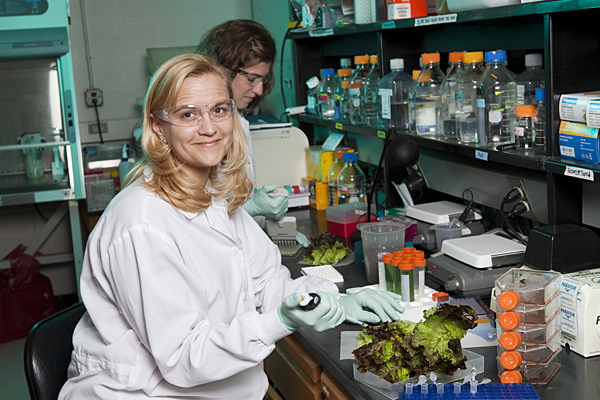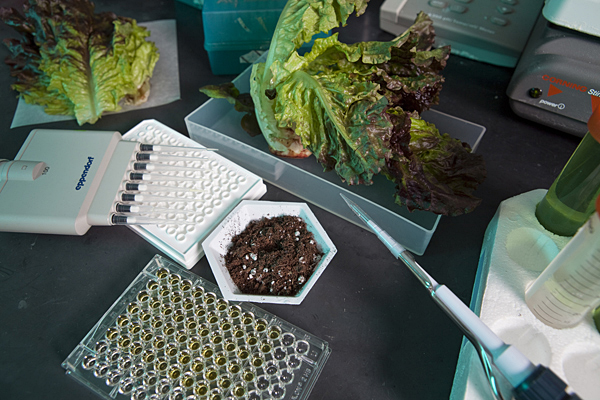


Safe produce
University's Kniel, Everts join study of produce safety
9:25 a.m., Dec. 9, 2011--Researchers at the University of Delaware are participating in a project that is focused on increasing produce safety and delivering more trustworthy salad fixings.
Total funding for the University of Maryland-led project amounts to $9 million, with $5.4 million in contributions coming from the U.S. Department of Agriculture's National Institute of Food and Agriculture and substantial industry funds.
Research Stories
Chronic wounds
Prof. Heck's legacy
The three-year study promises to be one of the most comprehensive studies of fresh produce safety ever conducted.
Produce safety has been a hot topic ever since 2006, when a deadly batch of spinach killed three people and sickened hundreds of Americans. The project will involve extensive testing and data collection by industry, supplemented by field experiments involving eight other university and federal laboratories around the country.
Kali Kniel, associate professor in UD's Department of Animal and Food Sciences, and Kathryne Everts, professor and Cooperative Extension specialist in plant pathology at Maryland with a joint appointment at UD, are part of the University of Delaware team.
“Since the large outbreak of E. coli in 2006 which was traced back to spinach grown in the Salinas Valley of California, produce commodities have been under great scrutiny," Kniel said of the project. "As we all know fresh fruits and vegetables are grown outside, which puts them at great risk for coming in contact with biological hazards like pathogenic bacteria and viruses. There are some processes that growers and packers can do to reduce the risk but the science is still not there to completely understand what those are. This project will help to resolve that for very important and ‘high-risk’ products, including leafy greens and tomatoes.”
Kniel explained the role that she and Everts will play in the study, saying, “Dr. Everts and I will be working with the farmers and packers to both develop metrics and to disseminate the science-based results of the project. I am particularly looking forward to working with regional growers and packers to help them deal with the food safety challenges including increased biological testing and best practices for safe compost and water use.”
Robert Buchanan, a University of Maryland professor and director of its Center for Food Safety and Security Systems, is heading the research initiative.
In addition to UD and Maryland, other universities involved include Ohio State University, Rutgers University, the University of California Davis, the University of Florida and the University of Maryland Eastern Shore. The USDA and the Food and Drug Administration (FDA) will be involved in the research as well.
The initiative's industry partners -- representing more than 90 percent of the leafy greens and tomato production in the United States -- will conduct about 200,000 separate tests during the project to measure the presence of pathogens.
“This project is very unique in that it has the support of the industry on a significant scale. We have a great team of scientists and great industry support,” Kniel said.
The research aims to create the scientific basis for detailed safe, hygienic practices in farming, packing, transporting and storing fresh produce.
The idea is to prevent water, air or ground sources of pathogen contamination by setting standards or benchmarks that can be applied in a variety of growing regions and countries.
The study will examine questions such as how far apart do you need to keep a lettuce patch from pigs or other farm animals to prevent bacterial contamination and what kinds of barriers are needed to prevent contaminated water from reaching crops?
Members of the research team said they believe the project will give regulators, farmers, packers and others along the supply chain the scientific and technological knowledge needed to develop and defend produce safety protocols, or "metrics" as the industry calls them.
At the production stage, the research will focus on air, water and other environmental factors related to potential contamination by pathogens; risks during harvesting, packing, and processing; as well as temperature and other handling concerns as produce moves to market.
Photos by Ambre Alexander









